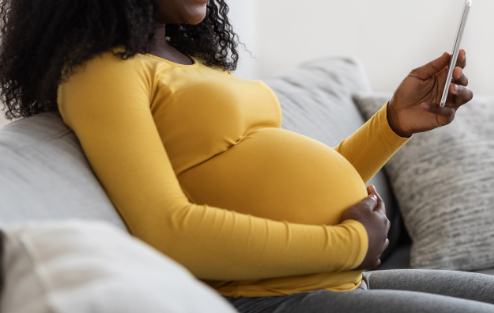June 24, 2022
Sydney and Chenise: A Doula Birthing Story

Sydney has been a doula for one-and-a-half years, but her interest in the field dates to childhood.
“I used to watch ‘A Baby Story’ on TLC for fun, instead of cartoons,” remembers Sydney. As a teenager, Sydney became the point person for friends with questions about reproductive and sexual health.
“When I went to Drake University, my sister mentioned doula work to me, but I wasn’t sure it was right for me,” says Sydney. Instead, she took courses on global and U.S. reproductive law and politics. “After one of the classes, my professor said, ‘you need to be a doula,’” says Sydney, who decided to pursue that path after graduating from college. Doulas are trained to provide advice, information, emotional support and physical comfort to a mother before, during and just after childbirth.
Learn About EveryStep's Work in the Community
Sydney is part of the Iowa Title V Doula Project, a collaboration between EveryStep and the Iowa Department of Public Health. The pilot project pairs Black-identified community members with community-based doulas. To increase the number of community resources, including culturally congruent doulas, the project provides formal doula training.
Since completing her doula training in January 2022, Sydney has worked with eight clients who she has so far seen through five pregnancies, and she has attended four births. “I remember being at my first birth and I had never felt more comfortable,” says Sydney. “I had this feeling [that] this is what I’m supposed to be doing. This is what I’m here for.”
Sydney is passionate about the birth experience of Black women. “People don’t like to listen to women, Black people or children. When any of those groups say, ‘hey, something’s wrong,’ people tend to brush it under the table. Everyone needs an advocate in their lives — someone to be on their side and empower them.”
Connect with EveryStep
Through the partnership with EveryStep, Sydney met Chenice, the mother of an 8-year-old daughter and toddler twins. “[Sydney] was so helpful to me,” says Chenice. “She was somebody you could talk to if you were having pregnancy problems. She was like a sister. We had lots of talks — she asked me what I preferred or liked, and how my last labors were. When I was having pains, she’d check into it. I didn’t know I had to get an antibiotic shot before I had the baby, and she sent me information about that so I’d be prepared.”
Chenice and Sydney worked out a birth plan that did not include a C-section. Chenice had been hospitalized for over two months prior to delivering her twins, which was by C-section. It was not a good experience for Chenice and one she didn’t want to repeat; however, when a prenatal check-up found Chenice’s blood pressure skyrocketing, doctors told her she would have to have an emergency C-section.
Sydney was there for the news. “Inductions can be hard on the body, but there can be serious complications if you induce someone who has had a previous C-section,” says Sydney. The fact Chenice had undergone a previous C-section was not on her medical chart, so Sydney was there to point that fact out.
“Sydney told the doctors we did not want another C-section and the doctors said they understood, but it had to be done because of my blood pressure,” says Chenice. “It still ended up being a C-section, but they actually sat down and talked to me instead of forcing it on me. It helped having Sydney around because at first, I just started shutting down and she stood up for me.”
Chenice gave birth to a healthy baby boy.
After the birth, Chenice started having swelling and pain. She called Sydney for advice. “She was like, go to the ER now, but I told her I could push through the pain. But she said, ‘no, you have to go now.’ I ended up having an infection,” says Chenice, who received treatment and recovered.
Sydney intends to continue her training for post-partum doula and fertility doula, and wants to work specifically with LGBTQ and minority families. “I think those families could really benefit the most,” says Sydney.
“I think the biggest part of being a doula is that you get to see somebody at their lowest point and their highest point and you get to be there with them through it all. A lot of times doctors and nurses see patients as a ‘physical body’ but as a doula, you see the person,” says Sydney. “It’s an amazing thing to be able to be a part of someone’s life like that.”
Chenice’s sister recently learned she was pregnant and Chenice was able to share her positive doula experience with her. “I asked my sister if she wanted a doula and she did, so I got Sydney another person!”
EveryStep can offer critical support to new parents — an especially vulnerable stage in life — weaving together the threads of a care and support network to create an inclusive social fabric where everyone can flourish. By offering the connections, tools and resources they need to build a healthy family, they can become part of a flourishing, healthy community.
You can ensure that new parents who are struggling in your community receive the support they need. Consider a monthly contribution to strengthen Iowa’s care and support network.
Donate Now
Investing in Iowa’s care and support network means no one must face adversity alone.
If you or someone you know is struggling to find the support they need, please contact EveryStep at 515-558-9946. Or complete the commitment-free, confidential “Find Care” form on EveryStep’s website at https://www.everystep.org/find-care. EveryStep staff will follow up with a phone call to answer your questions and provide assistance.